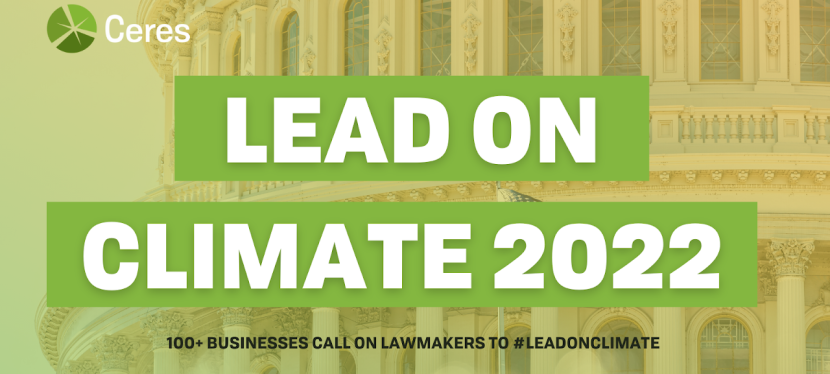SGI participated in a delegation of more than 100 large companies and investors to meet with key lawmakers of both parties this week to ask them to LEAD on Climate 2022. It was a united call for Congress to pass an ambitious package of federal clean energy, transportation, infrastructure, and advanced manufacturing investments.
Best Buy, bp America, Gap, General Mills, HPand Microsoft were among the major U.S. employers, innovators, and manufacturers spanning all sectors of the economy participating in this advocacy event. Representatives from the participating organizations met with lawmakers and Congressional staff on Wednesday, May 11, and Thursday, May 12, in virtual forums. 90 meetings were scheduled over this two-day period.
View the full list of LEAD on Climate 2022 participants here.
This fourth annual business advocacy event gives leading companies and investors the opportunity to make the strong economic case for federal climate action, elevating their calls for clean energy and environmental justice investments that will bolster the nation’s competitiveness, lower energy costs, strengthen domestic supply chains, and confront the threat of the climate crisis. U.S. Sen. Sheldon Whitehouse, Siemens Corporation’s Barbara Humpton, PSEG’s Ralph Izzo, and Hannon Armstrong’s Susan Nickey participated in a virtual roundtable and media briefing as part of LEAD on Climate 2022 on May 11th.
Representing SGI in the meetings, associate director Chris Cox said, “Fr. Mike Crosby began making the moral and business case for addressing climate change decades ago. It’s an honor to continue this work in pressing for environmental justice, as the harms of climate fall most heavily on the poor, those on the periphery.”
Organized by the sustainability nonprofit Ceres, LEAD on Climate 2022 features companies and investors that collectively count more than $1.6 trillion in annual revenue and $4.6 trillion in assets under management, and that employ more than 3 million people in all 50 states. The event comes at a critical time when Congress considers major investments in clean energy, transportation, and infrastructure, as well as the advanced manufacturing and supply chain capabilities to support it, either through a budget reconciliation deal or a bipartisan energy package.
Specifically, companies and investors are calling for Congress to:
- Meet the urgency and scale of the climate crisis with ambitious federal investments to accelerate the transition to affordable, secure, domestic clean energy.
- Seize the economic opportunities to lead the world in clean energy manufacturing and deployment to create jobs, spur innovation, strengthen supply chains, and reduce costs and price volatility for businesses and consumers.
- Tackle inequity by targeting climate and clean energy investments in disadvantaged, rural, and frontline energy communities.
This is the second year that SGI has supported Ceres’ LEAD on Climate. With the midterm elections quickly approaching, the window is closing for the last, best chance of getting significant federal climate and clean energy investments passed in time to meet our climate, energy, and economic security goals.
Click here to watch the full recording of the roundtable and media briefing.


